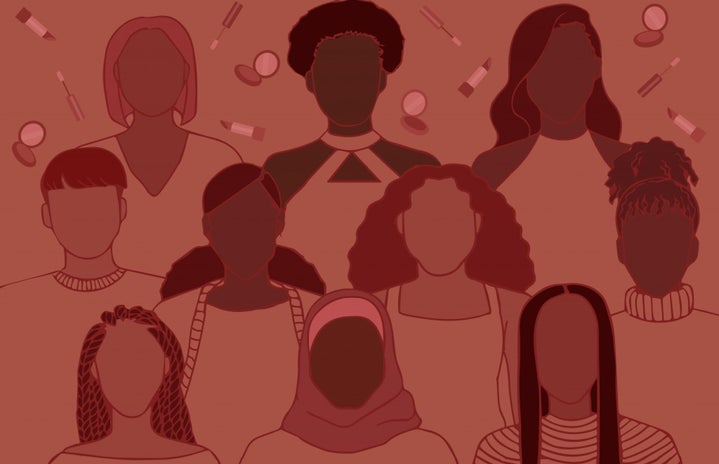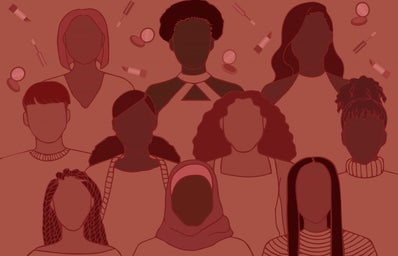Most women I know consider themselves feminists. This is a step in and of itself, but a self-proclaimed title isn’t always enough. Cis-gendered, straight, white, and able-bodied women are often culprits of promoting feminism and uplifting women only of a certain demographic. The focus usually lands on fighting for women’s rights, but only if those women are just like them. This is a product of the privilege many women grow up with and choose not to acknowledge. You might argue, “Well at least they’re feminists!” The thing is, feminism doesn’t work unless it champions women’s rights for all, including LGBTQ+, BIPOC, sex-workers, and disabled women, to name a few. Feminism isn’t just for people who look like Scarlet Johansson or Taylor Swift, and things can’t get done if people keep acting like it is.
Kimberlé Crenshaw, who coined the term, says intersectional feminism is “a prism for seeing the way in which various forms of inequality often operate together and exacerbate each other.” One clear example is the pay gap in the United States, where for every dollar a white man makes, a white woman makes 79 cents, but a black woman only makes 63 cents. The pay gap, as it turns out, can’t be fixed if we focus on just one type of woman. When women are part of multiple marginalized groups and have intersectional identities, an intersectional approach is needed. Feminism doesn’t work for everyone without intersectionality.
Our personal biases can take a while to break down, but here are some easy things we can do to become better intersectional feminists.
- Check your privilege
-
Privilege has a huge effect on all of our lives. As a cis, white, able-bodied woman, I am extremely privileged. I may have been discriminated against on the basis of sex, but never for race, ability or gender identity. I needed to go out of my way to recognize that the oppression that I face is not the same as the oppression that others with intersectional identities have to face. Privilege can come from wealth, gender identity, race, physical ability, sexual orientation and body type. By checking your privilege and recognizing that you don’t have the same experiences as everyone else, you open yourself up to a type feminism that doesn’t just help people like you.
- Listen to diverse groups and their experiences
-
Listening can sometimes be the hardest thing to do. It’s easy to hyper-focus on your own experiences with feminism and inequality. Every woman’s experience is valid and important, but they’re also all different. To enrich your own understanding of the issues that women face, it’s important to listen to the experiences of women who aren’t the same as you to form a deeper understanding of what other women go through. By doing this we further our intersectional perspectives and can learn how to advocate for others. Sometimes the best thing we can do, is shut up and listen!
Here are some of my favorite intersectional feminists who you can start listening to:
Blair Imani –@blairimani
Raquel Willis – @raquel_willis
Ijeoma Oluo – @ijeomaoluo
Jessamyn Stanley – @mynameisjessamyn
- Stop using ableist language
-
By using language that’s offensive and harmful to those of marginalized groups, we perpetuate and normalize the oppression that they face. An easy way to stop doing this is to erase ableist language from our vocabulary. In general, erasing slurs from your vocabulary, unless you are part of the marginalized group the slur is directed towards, is one of the easiest things you can do to stop contributing to the oppression of other women.
- Learn to take criticism
-
If a Black woman tells a white woman that they’re being racist, it’s up to the white woman to see what she can change about her actions. This applies to every community, not just with race. Whether you like it or not, everyone has internal biases, and it can be hard to dismantle them. The most important part is to allow yourself and others to apologize, be educated, and improve. When we don’t listen to people from marginalized communities when they tell us how to evolve the white women’s feminism to become a movement truly about equality, we can’t ever achieve complete equality. If you choose to ignore someone’s experience concerning their identity, you become just as bad as people who tell women that sexism doesn’t exist. You, then, are perpetuating that harmful idea within your own movement.
- Respect people’s pronouns and gender identities
-
Feminism is often associated with a ton of assumptions about gender. Simple phrases like, “All people born with a penis are more privileged”, erases the validity of many trans women’s experience with sexism. Remember, gender and sex are separate, and trans women are women. Pronouns are an important aspect of identity, a great way to ensure you’re never making someone uncomfortable is to just ask, “Hi, my pronouns are *blank*, what are yours?”, because misgendering someone is extremely harmful. An easy way to erase the stigma around pronouns is to put yours in your Instagram bio, even if you’re cisgender. This signals that you respect gender identity and are contributing to normalize sharing pronouns. By also dismantling the idea that gender identity and expression go hand-in-hand, this practice relieves some of the burden on trans/nonbinary individuals to continuously explain their identities and justify their experiences. All women deserve to benefit from feminism, not just those who were assigned female at birth (AFAB).
- Challenge beauty standards
-
Hollywood tells us that the only women worthy of feminism and equality are those that fit Western beauty standards. This contributes to the oppression of fat women, women with eating disorders, BIPOC, and generally any woman who doesn’t look like every Hollywood starlet (pretty much all of us)! Women also tend to make the argument that women aren’t fat, they’re beautiful! This only insinuates that a woman can’t be both, when in reality, any form that a woman is in, is worthy of fair treatment. Body positivity is a huge part of intersectional feminism, because all women are beautiful and deserve respect and that’s never in spite of what they look like.
- Use your voice to advocate for others
-
Finally, we all have the power to speak up for those who are left behind by the movement of white, not intersectional, feminism. By becoming aware of our own privilege, we can recognize that, unfortunately, some women’s voices are easier heard by the general public than others. In this way, those with privilege are able to use their platforms to post educational content that leads to the empowerment of other women. It’s on all of us to help each other and to share sources that uplift women who need it.
It’s important to remember that real women are all around you, and there is no “one size fits all” definition for what a woman should be. We are all affected differently by sexism, but we are all worthy of respect, and we are all in the same fight for equality. Women are often taught to turn on one another to lift themselves up, but we all truly need each other. We are all trying, and the world might be just a little better if we can all be there for one another.


